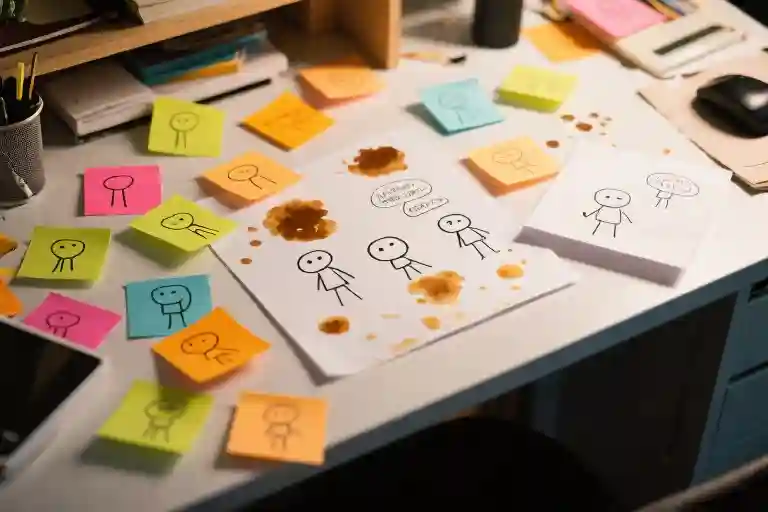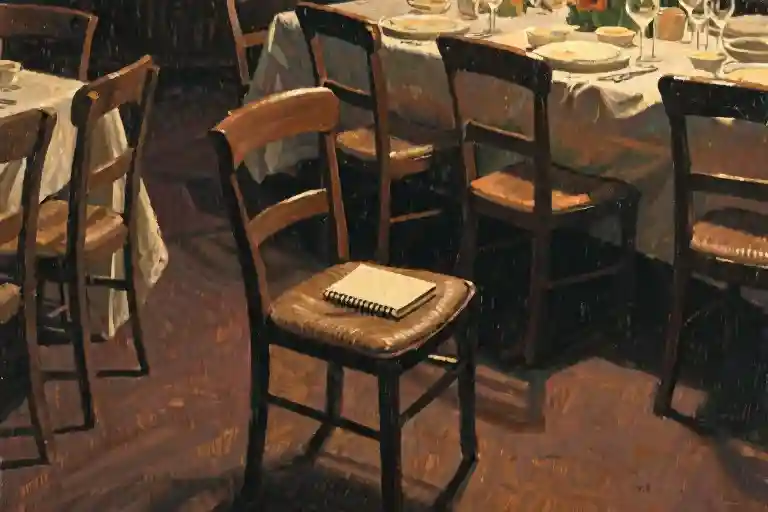Hi! I’m Me! And I don’t really know myself.
That sentence alone holds more truth than any polished introduction I could craft. Is anyone truly knows themselves, or are we all just performing versions of who we think we should be? The question lingers like an unfinished melody, haunting in its simplicity yet endlessly complex in its implications.
I’m what you might call a walking contradiction – a loud girl who’s quiet inside. My external self thrives in conversation, filling silences with animated stories and laughter that sometimes feels too big for my body. But beneath this surface exists another reality: a silent observer drowning in an ocean of thoughts that never seem to settle. This duality isn’t poetic; it’s exhausting. The version of me that people see and the one I experience internally feel like separate entities, constantly negotiating who gets control.
My mind operates like a relentless machine, processing every interaction, every glance, every unspoken tension in a room. While others might notice the decor or music at a gathering, I’m cataloging microexpressions, tracking emotional undercurrents, mentally recording conversations for later analysis. This hypersensitivity extends beyond social situations – I overanalyze past conversations, future possibilities, and present moments with equal intensity. The mental noise rarely quiets, not even in sleep, where my dreams often feel like continuations of daytime anxieties.
What makes this particularly frustrating is the disconnect between my racing thoughts and my ability to articulate them. With thousands of words constantly flooding my mind, you’d think expressing myself would come easily. Yet in crucial moments, my thoughts scatter like startled birds, leaving me grasping for coherence. The irony isn’t lost on me – someone so preoccupied with communication constantly failing to communicate effectively.
This internal chaos manifests physically too. There are days when my body feels like a poorly fitting costume, when the act of maintaining eye contact requires conscious effort, when the buzz of fluorescent lights feels like assault. Other times, I’m acutely aware of my own performative nature – the way I modulate my voice to sound more confident, the practiced smiles that come too easily, the careful curation of which parts of myself to reveal and which to conceal.
The question “Who am I?” becomes increasingly difficult to answer the more I examine it. Am I the person I present to the world, or the one I experience privately? Are either of these versions authentic, or just different shades of performance? The uncertainty creates a peculiar kind of homesickness – a longing for a self I haven’t yet discovered, a place within myself where I might finally feel settled.
Perhaps this is why writing becomes both sanctuary and prison. The page offers temporary relief, a place to deposit some of the mental clutter. But each attempt to articulate my experience only reveals how much remains unexpressed. Writing doesn’t resolve the contradictions; it merely documents them, creating a map of a territory I still don’t understand. The more I write, the more I realize how inadequate language feels for capturing the full complexity of human experience – especially when that experience feels as fragmented as mine often does.
This persistent self-questioning isn’t intellectual exercise; it’s survival. When you don’t instinctively know who you are, you become hypervigilant to clues – reactions from others, patterns in your behavior, emotional responses to situations. Each becomes data to analyze in the ongoing project of self-construction. The exhausting part isn’t the questioning itself, but the realization that the answers keep changing, that the self is less a fixed point than a constantly shifting horizon.
So here I am: loud but quiet, connected but isolated, self-obsessed yet strangely unfamiliar with myself. If this sounds confusing, imagine living it. The contradictions don’t cancel each other out; they coexist in uneasy tension, making every interaction, every decision, every moment of introspection feel like navigating uncharted waters without a compass.
But perhaps this very confusion contains its own truth. Maybe the self isn’t something to be discovered like a buried treasure, but something we continually create through our questions, our struggles, our attempts to bridge the gap between who we are and who we imagine ourselves to be. Maybe not knowing is part of the knowing. Maybe the loud girl and the quiet one aren’t enemies, but collaborators in an ongoing project of becoming.
Hi. I’m Me. And I’m learning that not knowing myself might be the most authentic thing about me.
The Ocean in My Head: When Thoughts Never Stop
The ceiling fan spins in lazy circles above me, its rhythmic hum drowned out by the tidal waves crashing inside my skull. It’s 3:17 AM according to the neon digits on my nightstand, but my brain refuses to acknowledge the concept of nighttime. This is what overthinking feels like – being trapped in a riptide of thoughts while your body lies motionless on the shore.
When Your Mind Becomes a Maze
Writing was supposed to be my escape route. I imagined it as a golden thread that would lead me out of this labyrinth of thoughts. Instead, every sentence I type becomes another turn in the maze, every paragraph a dead end that circles back to where I started. The words knot themselves like tangled fishing line – the more I try to straighten them, the tighter the snarl becomes.
There’s a particular cruelty to having thousands of words trapped behind your teeth while struggling to form coherent sentences aloud. In conversation, my racing thoughts behave like hyperactive children – interrupting each other, tripping over themselves, leaving me stammering through half-formed ideas. The disconnect between my overthinking mind and my sluggish tongue creates a special kind of social exhaustion.
The Physiology of a Restless Brain
Science explains what poets romanticize: our brains aren’t designed for this constant barrage. Neuroscientists call it ‘perseverative cognition’ – when your body reacts to mental stress as if it were physical danger. My muscles tense as though bracing for impact. My breath shallows like I’m running from something. Even my digestive system joins the rebellion, because apparently gut bacteria don’t appreciate existential crises at 4 AM.
The cruelest irony? The more I chase sleep, the more elusive it becomes. Counting sheep transforms into calculating life regrets. The darkness behind my eyelids becomes a movie screen projecting every awkward interaction from the past decade. My pillow might as well be a psychiatrist’s couch, except there’s no therapist – just me, my overthinking mind, and the unblinking eye of the moon through my window.
When Language Fails Us
Perhaps the deepest frustration lives in the gap between experience and expression. There are days when emotions flood my system with such intensity that they liquefy language itself. I’ll grasp for metaphors like lifelines – comparing the mental noise to static, to storm surges, to a orchestra tuning out of sync – but the words always fall short of the actual sensation.
This linguistic limitation creates a peculiar isolation. How do you explain to someone that you’re drowning when they only see you sitting calmly on the shore? How do you describe the weight of an ocean they can’t perceive? The loneliness isn’t from lack of company, but from the unbridgeable distance between what I feel and what others can understand.
The Temporary Anchors
Over years of this, I’ve collected small lifelines:
- Voice memos at 2 AM when sentences won’t stay still
- Scribbled phrases on receipts and napkins
- The sacred ritual of making tea, forcing my hands to focus on measuring leaves instead of wringing themselves
None of these ‘solve’ the overthinking, but they create momentary eddies in the current. Like placing stepping stones across a river, they don’t stop the flow, but make it possible to cross without being swept away. The thoughts still come – relentless as tides – but occasionally, I find purchase on solid ground between the waves.
The Weight of Seeing Too Much
Smiling comes easily to me. There’s magic in how a simple curve of lips can dissolve barriers between strangers, how shared laughter creates instant kinship. I’ve always believed smiles are the purest form of human connection – wordless yet profound. But lately, my reflection shows something unsettling: the smile stays bright while my eyes drown in unspoken sorrow.
This is the paradox of high empathy. We become bridges for others’ emotions while our own foundations crumble. The cashier’s forced cheerfulness, the classmate’s nervous finger-tapping, the elderly neighbor’s lonely gaze – these microexpressions imprint on me like tattoos. Most painfully, I notice the children.
When Empathy Becomes a Curse
“I hate how I connect to them too much.”
The marketplace near my apartment hosts invisible tragedies. A girl no older than twelve balances a tray of cigarettes on her head, her school uniform peeking beneath ragged sleeves. Her eyes hold the weary calculation of an adult as she mentally divides her day between sales quotas and homework. Beside her, a boy demonstrates magic tricks with bottle caps, his performance punctuated by stomach growls. Their resilience breaks me in ways their suffering never could.
Guilt metastasizes in my chest when I compare their struggles to my existential angst. What right do I have to feel lost when they’re fighting just to exist? This empathy overload triggers a vicious cycle: their pain amplifies mine, which then intensifies the shame for feeling pain at all. The psychological term is “empathy fatigue,” but it feels more like emotional radiation poisoning – cumulative, invisible, and inescapable.
The Physics of Emotional Contagion
Science explains why highly sensitive people (HSPs) absorb emotions like emotional sponges. Mirror neurons fire identically whether we experience pain or witness it in others. For 20% of the population with sensory processing sensitivity (Aron, 1997), this neural wiring lacks an “off” switch. We don’t just understand others’ feelings – we physically experience them.
This explains why:
- A friend’s breakup leaves me sleepless for nights
- News reports trigger physical nausea
- Strangers’ silent suffering feels like my personal failure
The Existential Math of Suffering
“If suffering is a spectrum, then where do I fit on it?”
Comparative suffering is emotional quicksand. The mind constructs false equations: Their trauma > my trauma = my pain is invalid. But trauma isn’t competitive diving – there are no difficulty scores. As psychologist Guy Winch notes, “Pain is not a contest. When we rank our struggles against others’, we always lose.”
Consider these truths:
- Two people can drown in different depths
- A papercut still bleeds even with bullet wounds nearby
- Your nervous system can’t calibrate based on global suffering
Rebuilding Emotional Boundaries
After years of drowning in collective sorrow, I’m learning sustainable empathy. These strategies help:
The 3-3-3 Rule:
When overwhelmed by others’ pain:
- Name 3 facts about your current environment (“Gray chair, bird sounds, peppermint taste”)
- Identify 3 sensations in your body (“Cold feet, tense jaw, heartbeat”)
- Recall 3 unrelated memories (“Third grade recital, blueberry pancakes, train delay last winter”)
This neurosensory reset grounds you in your separate existence.
The Permission Paradox:
Instead of thinking “I shouldn’t feel bad because others have it worse,” try:
“Because others suffer, I honor my pain by addressing it – this fuels my capacity to help.”
Empathy ≠ Responsibility:
You’re a witness, not a savior. As poet Nayyirah Waheed writes: “Help others, but not more than you honor yourself.”
The Gift Beneath the Burden
This sensitivity that exhausts me also gifts me with:
- Depth of human connection few experience
- Ability to detect unspoken needs
- Creative fuel for art that heals others
Perhaps, as researcher Elaine Aron suggests, HSPs are society’s emotional early warning system. Our pain mirrors collective wounds needing attention. The challenge lies in serving as mirrors without becoming casualties.
“I wish I could disconnect,” I wrote earlier. Now I realize – I don’t want numbness. I want the strength to feel deeply without drowning. To let empathy flow through me like water through a sieve, nourishing without accumulating. To smile authentically, with eyes that reflect my truth as clearly as they perceive others’.
Because the world needs people who feel intensely – just as it needs us to survive those feelings.
The Self That Keeps Escaping
There’s a peculiar agony in being pulled apart by your own contradictions. Like standing at the edge of two cliffs, each representing a version of yourself you can’t reconcile. One moment you’re the life of the party – loud, vibrant, effortlessly social. The next, you’re drowning in silence, your mind a tempest of unspoken thoughts that no amount of words can tame. This isn’t just mood swings; it’s identity whiplash.
The Anatomy of Being Torn
When people say “be yourself,” they never mention what happens when you don’t know which “self” to be. The outgoing friend who needs solitude like oxygen. The empathetic listener who absorbs others’ pain until their own becomes indistinguishable. The writer whose words flow freely on paper but clot in their throat during conversations. These aren’t personas we switch between – they’re simultaneous realities warring for dominance.
I’ve come to visualize this internal conflict as literal tearing. Not the clean split of a decision made, but the ragged edges of flesh refusing to fully separate. The pain isn’t in choosing a side, but in the impossible tension of maintaining both. My therapist calls it “cognitive dissonance.” I call it living with a double exposure soul.
Romanticizing the Ultimate Escape
Here’s the uncomfortable truth they don’t put in mental health brochures: when the noise inside becomes unbearable, nonexistence whispers seductively. Not in the graphic sense of ending life, but in the fantasy of pressing pause on existence itself. To stop being perceived. To stop perceiving. To mute the constant inner commentary analyzing every thought three layers deep.
This isn’t suicidal ideation – it’s existential claustrophobia. The desperate craving for what Emily Dickinson called “the pause of space” when she wrote:
“I felt a Funeral, in my Brain…
And then a Plank in Reason, broke,
And I dropped down, and down -“
That poetic descent resonates because it captures the terrifying allure of mental freefall. We don’t necessarily want death; we want cessation from the exhausting work of maintaining a coherent self amid the chaos.
The Spectrum of Suffering
Guilt compounds this struggle. In moments of clarity, I tally my privileges like rosary beads: stable housing, education, healthcare. Then comes the crushing awareness that my suffering exists on a spectrum where others endure far worse. This realization should comfort; instead, it isolates. If pain were measurable in units, would mine even register?
But here’s what years of therapy finally helped me understand: suffering isn’t comparative. Drowning in six feet of water kills as surely as drowning in sixty. The depth of the ocean doesn’t negate the reality of your struggle to stay afloat. My therapist keeps reminding me: “Your pain is valid because you feel it.” Some days, that’s the only lifeline I have.
The Paradox of Choice
The cruelest twist? Even if I could choose one version of myself to embody fully, I’d mourn the loss of the other. The quiet observer makes the vibrant storyteller more nuanced. The emotional sponge gives the logical analyst greater depth. These aren’t flaws to fix but tensions to hold – fragile, precious, exhausting.
Perhaps this is the hidden curriculum of high sensitivity: learning to live in the “and” rather than the “or.” To be loud AND quiet. Empathetic AND self-protective. Present AND escaping. Not torn between selves, but learning to be the bridge that connects them.
Because here’s what no one tells you about identity crises – sometimes the way out isn’t through resolution, but through making peace with the questions themselves. As Rilke advised: “Be patient toward all that is unsolved in your heart and try to love the questions themselves.”
Maybe the self isn’t something we find, but something we continually become – wave after wave, contradiction after contradiction, moment after moment.
Words That Almost Save Me
Writing should be an escape, but it often feels like diving deeper into the maze. The words spill onto paper, leaving more questions than answers—each sentence a fragile raft in this endless ocean of thoughts. For those of us whose minds refuse to quiet, writing becomes both sanctuary and battleground. It never fully saves, but it almost does.
The Liminal Comfort of Being Understood
There’s a peculiar relief when someone reads your words and says, “I feel this too.” For a moment, the loneliness fractures. The validation isn’t that they’ve solved your chaos, but that they recognize its shape. This is the paradox of writing through mental turmoil: the act can’t untangle the knots, yet the mere fact that others see those knots makes them slightly easier to bear.
- The 3 AM Epiphanies: Those rushed notes in your phone—half-coherent, raw—are proof you’re trying to speak a language no one taught you.
- The Unfinished Drafts: Stacked like abandoned lifeboats, each represents a battle with thoughts too fast for fingers.
- The Shared Silence: When readers comment “This is exactly how my mind works,” the relief is visceral, temporary, and utterly necessary.
Why “Almost” Matters More Than “Saved”
The limitation is the point. Writing won’t stop the flood of overthinking (if only it could), but it builds levees—imperfect, porous barriers that make the deluge survivable. Consider how:
- Metaphors Make the Unspeakable Visible
Calling your mind “an endless ocean” isn’t just poetic; it gives others a map to find you in the storm. - Fragmented Writing Mirrors Fragmented Selves
Those disjointed journal entries? They’re honest artifacts of a mind that refuses linearity. - The Page Absorbs What People Can’t
Ever noticed how writing down a dark thought sometimes dulls its edge? The paper holds it so you don’t have to.
A Question to Carry With You
“What’s one sentence you’ve written that made you feel less alone?”
(Share it below—not because it needs to be profound, but because someone might need to read it tonight.)
P.S. If this resonated, you might also wrestle with:
- The exhaustion of being a “highly sensitive person” in an overwhelming world
- Why “overthinking mind” loops feel like mental quicksand
- That guilty relief when someone else admits they “romanticize not living” too
You’re not failing at healing just because words don’t fix everything. Sometimes they’re just buoys—small, floating proofs that you’re still above water.
When Words Become Lifelines
Hi! I’m Me! I think too much…
The words echo like a half-remembered song, the kind that lingers in your bones long after the music stops. This confession isn’t just an opening line—it’s the frayed edge of a truth we rarely say aloud: knowing yourself might be the hardest thing you’ll ever do.
The Paradox of Expression
Writing should be an escape, but for minds like ours—the overthinking, overfeeling kind—it often becomes another maze. The more we write:
- The deeper we dive into our own chaos
- The clearer our contradictions become
- The more we realize how language fails us
Yet here’s the quiet miracle no one talks about: the act of trying matters more than the result. When I scribble fragments at 3 AM or tear up pages that “didn’t get it right,” I’m not failing. I’m mapping the unmappable parts of myself—one imperfect word at a time.
The Oxygen Mask Principle
Remember flight safety instructions? Secure your own mask before assisting others. For those of us who feel the world’s pain like physical wounds, this isn’t just advice—it’s survival.
Three truths I’ve learned the hard way:
- Empathy isn’t martyrdom: Feeling deeply doesn’t obligate you to drown with others
- Your pain isn’t a competition: Suffering isn’t graded on a curve
- Small salvations count: A single honest sentence can be a lifeline
The Gift of Unanswered Questions
That question you’ve been circling—Does your mind ever feel like an ocean?—isn’t meant to be solved. It’s a beacon, signaling to others: You’re not floating alone.
What writing gives us isn’t solutions, but something equally vital:
- Proof that our inner chaos isn’t madness
- Evidence that others navigate similar storms
- Permission to exist exactly as we are—loud and quiet, messy and radiant
Where We Go From Here
The page won’t save you. But it will witness you. When I write “Hi! I’m Me!” again at journey’s end, it’s not resignation—it’s rebellion. A refusal to let the chaos win.
So tell me, friend:
- What does your ocean sound like today?
- Where do your words fail you beautifully?
- How will you honor the self you’re still becoming?
P.S. No answers required. Sometimes just asking the question is enough.





